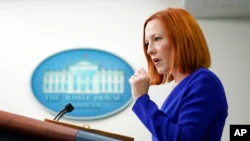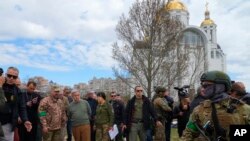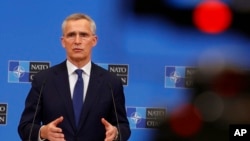U.S. President Joe Biden asked Congress Thursday to approve $33 billion in additional aid for Ukraine to help it resist invading Russian forces over the next five months. The House overwhelmingly passed legislation aimed at removing obstacles that slow the delivery of military assistance.
Those two developments would allow the U.S. to significantly ramp up both the quantity and speed of weapons deliveries to Ukraine.
“Investing in Ukraine’s freedom … is a small price to pay,” Biden said in a White House address. “We’re not attacking Russia. We’re helping Ukraine defend itself.”
The White House said the new $33 billion spending plan would include more than $20 billion in new weaponry and military assistance, and $8.5 billion in economic aid for Ukraine. The White House said the remaining funds would be used for food production assistance, to allow use of the Defense Production Act to expand domestic production of other items disrupted by the conflict, and to support sanctions enforcement.
Biden’s proposal is for more than twice the $13.6 billion that Congress previously authorized, a total that now has been mostly exhausted with arms shipments to Ukraine in recent weeks.
“Basically, we’re out of money,” to assist Ukraine, Biden said.
White House press secretary Jen Psaki said the administration is confident a politically divided Congress will continue to support U.S. assistance to Ukraine.
“Certainly there is an urgency to getting this funding done,” she said. “There has been bipartisan support in the past, and we’re certainly looking forward to working with them to get this done as quickly as possible.”
Also Thursday, the House of Representatives passed the Ukraine Democracy Defense Lend-Lease Act by a vote of 417-10. The Senate voted unanimously in support weeks earlier.
The act, which is a revival of a World War II program, allows the U.S. government to bypass procedural obstacles that slow the delivery of weapons.
“It is vital that the U.S. does everything possible to get the necessary weapons to Ukraine and our eastern European partners to defend against Russia’s unprovoked war of aggression,” said Michael McCaul, the lead Republican on the House Foreign Affairs Committee “With this bill, we are standing with the generations of Ukrainians impacted by this devastation.”
‘Aggression will not win’
In a direct message to Russian President Vladimir Putin, Biden said, “You will never succeed in dominating Ukraine.”
Biden criticized the Russian leader for cutting off natural gas shipments this week to Poland and Bulgaria, saying the United States and its allies “will not let Russia blackmail its way out of (economic) sanctions” that have been imposed on Russian financial institutions and oligarchs close to Putin.
“Aggression will not win. Threats will not win,” Biden said.
Biden’s new proposal calls for working more closely with international partners to “recover assets linked to foreign corruption,” and extend the amount of time to pursue money laundering prosecutions from five years to 10 years.
A White House statement said the measures would “enhance the United States government’s authority to hold the Russian government and Russian oligarchs accountable for President Putin’s war against Ukraine” — to “seize property linked to Russia’s kleptocracy,” as Biden described it.
Earlier Thursday, Ukraine’s presidential adviser said, “Ukraine should decide whether to strike (Russian) military facilities.”
“What we’re talking about here is not any intention of Ukraine invading Russia, and trying to take Russian territory, going after Russian civilians, going after Russian hospitals.” Psaki said, when VOA asked if the administration feared that could lead to an escalation. “We’re talking about consideration of military targets. It’s something very different.”
UN support
As Russia launched new attacks on eastern Ukraine, U.N. Secretary-General Antonio Guterres visited Kyiv and nearby suburbs left in shambles by Moscow’s assault. He later met with Ukrainian President Volodymyr Zelenskyy.
“The highest price is paid by civilians,” Guterres said of the war as he toured Borodyanka and Irpin, as well as Bucha, where the bodies of civilians were found after Russian forces withdrew from the area a month ago. Those discoveries prompted calls for investigations of possible war crimes. Guterres on Thursday encouraged Russia to cooperate in probes by the International Criminal Court.
“I fully support the ICC, and I appeal to the Russian Federation to accept, to cooperate with the ICC,” Guterres said. “But when we talk about war crimes, we cannot forget that the worst of crimes is war itself.”
“The sooner this war ends, the better — for the sake of Ukraine, Russia, and the world,” Guterres tweeted.
Friday Ukraine said it planned to try to evacuate civilians from the Azovstal steel plant in the southern city of Mariupol. Thousands of residents from Mariupol have taken refuge in the plant, where a significant number of Ukrainian troops are also holding out against Russian attacks.
Zelenskyy’s office, which announced the evacuation effort, gave no details on how it might be carried out.
NATO expansion
Russia’s invasion of Ukraine has pushed Finland and Sweden to consider applying to become members of the NATO military alliance. NATO Secretary General Jens Stoltenberg said if they do choose to take that step, the process could be completed quickly.
“It is, of course, for Finland and Sweden to decide whether they would like to apply for membership in NATO or not. But if they decide to apply, Finland and Sweden would be welcomed with open arms to NATO,” Stoltenberg told reporters in Brussels.
Russia has expressed opposition to prospective NATO membership for Finland and Sweden, saying if they do join, Russia will deploy nuclear weapons and hypersonic missiles to Kaliningrad, a Russian exclave on the Baltic Sea.
“This is fundamentally about the right of every nation in Europe to decide its own future,” Stoltenberg said. “So, when Russia tries to threaten, to intimidate Finland and Sweden from not applying, it just demonstrates how Russia is not respecting the basic right of every nation to choose its own path.”
National security correspondent Jeff Seldin contributed to this report. Some information came from The Associated Press, Reuters and Agence France-Presse.



